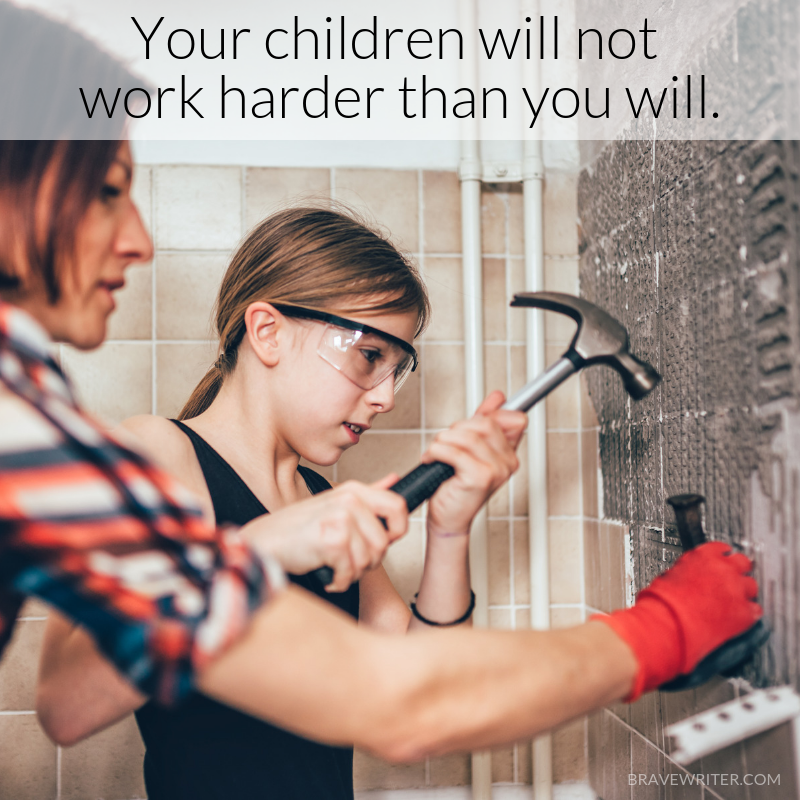Do you like to homeschool?

Corollary to the post, If it’s not working, it’s not working.
Sometimes when I hear about children who “won’t do their work” or “who are lazy,” I hear the following comment from the mom: “I need them to work independently.” Then they supply the reason which is one of the following: “I’m too busy, tired, sick of homeschool, have a part time job, need to tend to the younger kids, just moved, am pregnant, had a new baby, they are older and should not need me…”
A homeschool that is unhappy or a big struggle is often one where there is “work to be done” by children and a parent who can’t figure out how to “get the child to do the work.”
In other words:
An unhappy homeschool is one where neither parent
nor child wants to do the work that is homeschool.
Let’s look at that for a moment.
Think back to your favorite educational experiences. They weren’t all easy, were they? They weren’t all independent, were they?
My favorite learning environments challenged me to work hard, but I usually worked hard because the instructor worked harder than I did! I could feel the preparation in the lesson, I saw the commitment to my growth and the success of the outcome, I could tell that that educator was passionate about his or her field.
I was the least engaged in classes where the teacher seemed bored, distracted, barely showing up, expecting me to do homework with little interest in my actually learning… Was it the same for you?
Home education should not be an independent experience, even for (and perhaps especially for) teens!
I want to repeat that: high school should not be done alone in a room. It is not the time for a student to read, write a paper, and read some more. Self-teaching calculus is really really really hard. And tedious.
Home education is successful (and experienced as happy) when both parent and child are engaged in the process, and the parent puts in more work than the child. This is even true with unschooling—meaning that if you choose not to use formal educational tools, the learning happens because of your engagement with the larger world, noticing and creating opportunities to explore it and understand it. It doesn’t happen if you are working part time on the computer and your child is left to “learn” on her own.
Ask yourself: Do you like to homeschool?
If you don’t, then it is imperative that you find a way to love it (not just like it). Its success truly is contingent on your enthusiasm and energy. Yes, you can “get your children educated” at home without your enthusiasm, but at what cost? Will your children look back fondly on their home educations? Will they thrive and excel? Will you feel proud and gratified at the other end of the journey?
Homeschooling should not be a paler version of traditional school. Why do it if it is?
It’s okay, by the way, if the answer is “No, I don’t like homeschooling.” Start there. The next step isn’t necessarily to put your kids on the big yellow bus. The next step may simply be to recapture a love of learning for yourself—putting away all the teaching tools that have sapped your happiness and quieted your curiosity.
Rekindle interest in some area of learning and do it right in front of your kids, pulling them along. Pay attention to what you already love (old Jack Lemmon films, growing ferns, 18th century novels, opera, world news on the BBC, foreign languages, crafting, postmodern philosophy, supreme court decisions, showing horses). Share it. Live into it. Indulge it.
Pay attention to how you delve into your interests and apply that insight to how you educate (lead the way in learning) your young. Find the learning in any activity for a bit so that if you do in fact return to book-structured learning, you know how to go beyond the text to the experience of transformation/insight/appropriation (the true goal of learning).
Homeschooling out of duty will often create children who are either dutiful or resistant to learning, but not necessarily energized and excited about their educations. It’s no wonder that by high school there is a lack luster attitude about doing school work. It is experienced, by then, as work.




















[…] urged parents to consider the idea that their investment in home education ought to exceed their children’s output. When I did so, I did not have in mind that the parent would necessarily sit side-by-side with a 16 […]
quotes about young single mothers
Your children will not work harder than you will « A Brave Writers Life in Brief